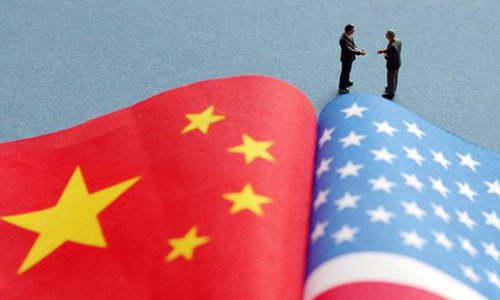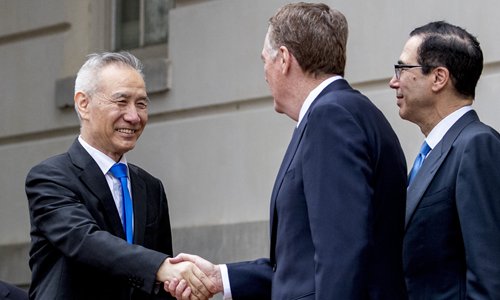Low expectations for China-US trade talks
By Wang Cong Source:Global Times Published: 2019/7/29 22:28:41 Last Updated: 2019/7/30 11:46:51
Some positive signals, but quick breakthrough unlikely amid US bullying: analysts

Chinese and US trade officials make attempt at striking a trade deal to defuse an increasingly bruising trade war that has rattled global markets and presented mounting challenges to both economies. Photo: VCG
As top Chinese and US trade negotiators prepared for their first round of talks in over two months on Tuesday, expectations of a breakthrough in resolving their bitter trade tussle that has dragged on over a year and weighed on economic growth in both countries are low as major sticking points remain and US bullying tactics continue unabated.
Chinese officials have agreed to restart negotiations and have shown their good faith for addressing the dispute through dialogue, but they are likely to exercise caution about making any commitment to an unreliable US administration and stick to their stated demands at meetings, Chinese analysts said on Monday.
Chinese and US trade officials are set to meet in the Chinese financial hub of Shanghai from Tuesday to Wednesday. It will be the 12th round of negotiations between the two sides since the trade war started last year and the first since talks fell apart in May.
The Chinese team will still be led by Vice Premier Liu He, and Chinese Commerce Minister Zhong Shan will also join the talks. The US side will be led by US Trade Representative Robert Lighthizer and US Secretary of Treasury Steven Mnuchin. Other details about the meetings remain unclear.
Days ahead of the planned talks, the two sides sent positive signals apparently aimed at creating a better vibe for the negotiations.
On Sunday, the Xinhua News Agency reported that China has started to purchase US agricultural products, including millions of tons of soybeans.
Earlier, the US announced that it would exempt 110 Chinese industrial products from tariffs and allow US companies to supply Chinese firms.

Chinese Vice Premier Liu He (left) shakes hands with US Trade Representative Robert Lighthizer (center) alongside US Treasury Secretary Steven Mnuchin as Liu arrives at the Office of the US Trade Representative for trade negotiations in Washington DC, in May. Photo: AP
Low expectations
Expectations for Shanghai are running low, as divisions remain on several issues, from tariffs to the wording of a potential deal and as the US continues on an apparently failed path of pressuring China.
"Given all the obstacles, it is rather unrealistic to expect that the talks will yield any concrete breakthroughs," He Weiwen, a former senior Chinese trade official, told the Global Times on Monday, noting that the first meeting would likely focus on regrouping after a two-month stalemate.
"There are many things to catch up after the back and forth in the past few weeks."
Even after the leaders of the two countries agreed to resume talks, the two sides have continued a war of words, with communications limited to phone calls. Chinese officials have appeared reluctant to resume talks because of a perceived lack of sincerity coming from the US side.
Since the truce, US officials showed willingness to restart trade talks but have not made concrete steps to implement the commitment US President Donald Trump made during the meeting with Chinese President Xi Jinping, including allowing US companies to supply Chinese telecom firm Huawei and lifting all additional tariffs.
Though US officials indicated that they would follow through on the commitment, Chinese analysts pointed out the difference between words and actions.
"We should pay attention to what they do, not what they say, and so far they haven't done anything to truly implement their commitments," said He, a senior fellow at the Center for China and Globalization.
The US "has not changed its maximum pressure tactics," He said.
On Friday, the US President ordered his government to devote "all necessary resources" to push for reform at the World Trade Organization (WTO) and remove developing-country status from some countries. US officials singled out China in a memorandum signed by Trump, although the move targeted other developing countries, including India.
The memo drew harsh criticism from the Chinese Foreign Ministry on Monday.
At a routine press briefing in Beijing, Hua Chunying, a spokesperson for the ministry, said that the US move would not gain any support and the US does not have the final say at the WTO.
"The US stance on developing-country status at the WTO revealed its capriciousness, arrogance and selfishness," Hua said, noting that such characteristics have become so apparent from the US that some in China have even coined a phrase, "one shouldn't act like the US," to describe bad behavior.
Returning to the negotiating table is a positive step that could help the two sides better understand each other and find a solution, according to Li Yong, deputy chair of the expert committee at the China Association of International Trade.
"Talking is always better than not talking," Li said. China is always open to talks but will not give up on its core interests, he noted.
"Regardless of what happens, I think China is prepared."
Newspaper headline: Experts advise caution ahead of China-US trade talks